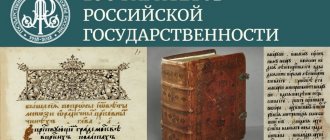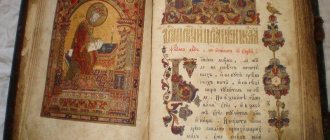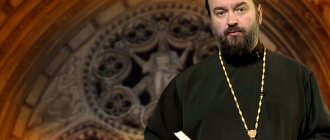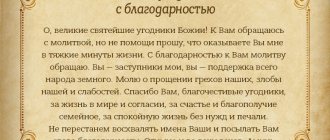№15 (624) / April 11 '11
Conversations with the priest
In this topic:
Conversations with the priest
Archpriest Alexander Torik: “Prayer is the communication of the human soul with God”
A conversation with the head of the Patriarchal Center for Old Russian Liturgical Tradition, Priest Ioann Mirolyubov, on air on the Soyuz TV channel.
– On the air of the Orthodox TV channel “Soyuz” is the program “Conversations with the Father.” In the studio of Mikhail Karelin. Hello, dear TV viewers!
The guest of our studio is the head of the Patriarchal Center of Old Russian Liturgical Tradition, Priest John Mirolyubov.
The topic of our conversation with Father John is the Old Believers and ancient Russian liturgical culture. Father John, you head the Patriarchal Center of the Old Russian Liturgical Tradition, what does it do, what tasks has His Holiness the Patriarch set for it?
– In 2004, the Council of Bishops of the Russian Orthodox Church created a commission on the affairs of Old Believer parishes and interaction with the Old Believers. This commission is located under the Department of External Church Relations, and its name shows what it does. Two main topics are regulation and coordination of the activities of all Old Believer parishes that are located in the Russian Orthodox Church, and everything related to interaction with the Old Believers.
First, let's understand the terminology. Old Believers are those Old Believer agreements that are outside the Russian Church, that is, in a state of schism. And the Old Believers, which were previously called Edinoverie parishes, also have a very good name - Orthodox Old Believer parishes; these are the parishes that are located within the Russian Orthodox Church
And so, to implement the programs of an authoritative commission, which includes a large number of bishops of the Russian Church, a center was created, which I head, a real working body that could publish literature for Old Believer parishes and be able to train personnel for them, study the ministry of these parishes, problems that arise; sometimes you need to travel to a diocese to deal with some circumstances on the spot; It is also very important to have a specific scientific program.
The other side of the activity is interaction with the Old Believers, real contacts, real common affairs. This is a very broad field of activity.
– The Old Believers and the ancient liturgical culture are one thing, or are they different concepts?
– The Old Believers believe that they have preserved the entire heritage of Ancient Rus', that they perform divine services in such a form, at least outwardly, as it was before the schism that occurred in the middle of the 17th century. To a greater extent, this is true, and for Russian culture this is very valuable. True, during the 350 years that we have been in a state of schism, some movements have also occurred with these communities of Old Believers. There was a 200-year period of their remoteness from any church hierarchy at all, when fugitive priests appeared who brought with them some customs and traditions.
In a word, from a scientific point of view, the question can be posed as follows: how adequate is modern Old Believer practice to what happened in the 17th century? As for the priests, the rules of worship are very similar. As for the Old Believers, who do not have a church hierarchy, this is a completely different worship service that has no sacraments at all.
In many parishes of the Russian Church, before the schism, there was a practice of performing divine services without a priest. The Pomeranian Rule was formed in the North, where the priest served several parishes, which is why services were held even if the priest was absent from them.
Our center has both a scientific and historical interest - to try to restore what was before. For example, Old Believer singing is more ancient singing than what is now found in most Old Believer parishes. If we can scientifically reconstruct some layers of worship, we can try to serve according to the Studio Rules. After all, it is known that worship in the Russian Orthodox Church has changed, and what we have in the middle of the 17th century is not at all what it was at the Baptism of Rus'. The texts were different, the editing of the texts was completely different. If now an Old Believer, who believes that he has the same books that were brought to the Russian land under Prince Vladimir, is given real ancient books, he will not even be able to read them. Because there was no separation of words at all, different vocabulary. So, trying to restore such services, at least out of scientific and cultural interest, is a very important task.
In my understanding, the service of the mid-17th century is the pinnacle of liturgical creativity. Then the divine service developed in a slightly different way.
“I propose to return to this a little later, and first answer the question of our TV viewer from the Belgorod region: “Father, I believe that the split occurred due to the fact that Peter I imposed Western values on us, Protestantism entered the Church, and so on. People did not agree with this and went into schism. When the government interferes in the affairs of the Church, it ends badly, and it ended with the Bolshevik revolution.” What is your answer, father?
– I can’t say anything contrary to the verb, the person understands everything absolutely correctly. Here we can only place some emphasis, because the question is very deep. It all started not under Peter, but fifty years earlier, when Alexey Mikhailovich turned his gaze to the West. His Holiness the Patriarch has repeatedly said that there was an attempt, starting with Peter I, to introduce the codes of a completely different civilization – Western – onto Russian soil. And we know that this experiment failed: the Russian person remained a Russian person, and we see that what corresponds to our national mentality is again entering church life.
The Old Believers arose fifty years before Peter, but they did not have such a massive character. There was no such decisive protest. But when Peter’s destruction began, so to speak, of the entire national heritage, culture, and customs, a mass process began. Further more. If we take the history of Russia during the Synodal period, the 18th-19th centuries, especially the 18th, this is a completely different aesthetics, different values, a different understanding of faith.
– Is Old Believers a heresy?
– There is a canonical rule – the second rule of Basil the Great, which very precisely defines this. There are three types of separation from the Church. There are communities where the foundations of the doctrine are very different from what was laid down by Christ and preserved in the Church. And people who convert from such communities to Orthodoxy need to be baptized, because it is not even clear whether they are Christians. There are communities that, for some minor points of doctrine, have moved away from the Church. This is the so-called second order, which is received through Confirmation. And there are such associations that, due to historical reasons, moved away from the Orthodox Church. This division implies a very real treatment. From my point of view, the Old Believers could be accepted with the third rite - Repentance, because these people are in a state of schism due primarily to historical reasons. If you feel repentance, come to the priest for Confession, and after that you become a member of the Church.
From the Old Believer environment, people come to us from agreements either priestly or non-priestly. There is no priesthood in the priestless ones, that is, people are baptized by the laity. They come from those Old Believer agreements where there is a priesthood, but apostolic succession is in doubt from the point of view of the Russian Orthodox and other Orthodox Churches: the priesthood believes that the grace-filled sacraments are not contained in these Old Believer directions. At least, these were the Synodal definitions before the revolution, no one canceled them, and we must seriously examine whether there is any reason to change them. The hierarchy today sees no reason to reconsider this issue. Therefore, if people come to us even from those hierarchies in which there is a priesthood, they still join us through Confirmation. For the simple reason that they received Baptism - it must be said that among the Old Believers it is performed immersively, and this is the correct form of performing Baptism. But we cannot admit that they are anointed, and if they are of non-priestly agreement, then they themselves understand that they were not anointed.
That is, today the general reception of Old Believers into the Russian Orthodox Church is accomplished through the second rite, through Confirmation. Moreover, in the words of Basil the Great, they are not considered apostates and heretics.
– Question from the Novgorod region; We are listening to you.
“Our parents were Old Believers, Old Believers, and we were baptized into this faith. What is the difference between Old Believers and Old Believers? My father baptized me when I was little, and now I go to an Orthodox church, because there is no other one anywhere. Am I sinning?
– In the Russian Orthodox Church you definitely do not sin. But how your parents or relatives might feel about this is another question. First, I’ll say something about the name: Old Believers and Old Believers. Old Believers is a self-name. They themselves believe that they are keeping the old faith. Old Believers is, rather, an external name, and many Old Believers are not very happy when they are called that, and sometimes even get offended, because the very word “Old Believers” emphasizes that the differences exist, as it were, only in the ritual, and they believe that the difference more profound.
It seems to me that the name Old Believers is more acceptable, because in fact this is what divides. If you ask the question, as the Old Believers themselves believe, whether there is a dogmatic, doctrinal division, then a certain, and rather large, category of Old Believers will say: “Yes, of course, there is, our faith is different. You have a new faith, we have an old one, we think differently.” But there is another category of Old Believers, quite significant in number, who will in every possible way convince that there are no doctrinal divisions. And, in fact, they are right. Indeed, there are no doctrinal divisions; there is something else - something that can be called the rule of faith.
We know: although there is one Orthodox Church of Christ, there are very different traditions - the Greek Church, the Georgian Church and many others.
To some extent, it is correct to call Old Believers Old Believers. Because they have a unique style of behavior, a system of values, and a certain regulation of life. During a deep and detailed conversation, it turns out that, ultimately, the differences are in the rituals.
One should not discount the most important thing – the special mentality of the Old Believers. At one time, Old Believer communities sent me to study in Orthodox schools - then it was called the Leningrad Orthodox Seminary and Orthodox Academy - I studied both there and there.
There were cases when friends came to me: to see, to inquire how representatives of the Old Believer consents felt in the Orthodox school. And I must say that they were shocked to see a certain seminarian walking along the corridor of a theological school in a cassock and eating an apple. In the understanding of the Old Believer, this is simply unthinkable, because if a person is going to do such an important thing as eating, he must first pray and concentrate on this! This is a certain culture of behavior.
I will say that this is precisely the basis of the economic success of the Old Believers. Not in any special secrets, but precisely in the fact that if they took on some task, then they concentrated on this task and did it with prayer, with blessing.
Now the question is, is sin being committed? There is an opinion that a person must die in the faith in which he was born. But this is a difficult question. After all, if our soul in its development comes to some new level of consciousness, then perhaps there is no need to stop there?
Especially if a person finds himself in an almost isolated situation: there is no connection with relatives, there are no fellow believers nearby. I think that such a person needs help. In particular, all our Old Believer parishes are open for this purpose. Because if a person is accustomed to praying with a certain liturgical spirit, it will, of course, be easier for him to find himself inside the Russian Church in a parish where the customs will be most similar to those to which he is accustomed.
– Are there any contradictions regarding dogmas and sacraments?
– There is no such dogma among the Old Believers that the Russian Church would understand differently. These are always the same doctrinal documents. But there is a difficulty with this kind of terminology. In the literature of the 17th century and in medieval Russian literature, the sign of the cross was also called a dogma. For Old Believers, it is the formal basis for the assertion that they have some other faith.
In fact, the sign of the cross held by the Old Believers contains exactly the same dogmatic ideas and symbols. Three fingers mean the Trinity: Father, Son and Holy Spirit, two fingers mean two natures in Christ. And the middle finger even bends a little, because it specifically means Human nature, which has suffered, and therefore the finger bends a little when the sign of the cross is made.
I myself come from an Old Believer environment, and such a sign is very dear to me. And from the point of view of common sense and logic, it seems to me that double-fingering is clearer. Because when we make the sign of the cross, we protect ourselves. And the cross is what Jesus Christ was crucified on. When we talk about this with Orthodox people, the vast majority of whom practice triplicity, they understand it in exactly the same way. Unfortunately, today our society has not yet eliminated aggression, even in the church environment.
Often you have to go to places where there are no Orthodox churches that observe the old rite, and people come to an ordinary church. We are all Orthodox people and we can end up abroad, we can go to the Greeks, we can go to the Orthodox Albanians, Serbs, Arabs. But very often members of our Edinoverie, or Old Believer parishes, which are located within the Russian Orthodox Church, complain to me that in our Russian churches sometimes there is a very unpleasant reaction to double-fingering. It seems to me that all this comes from deep ignorance and aggression.
– The next question is from Moscow.
– Father, do you think that if we use translations of Orthodox and Old Believer books into modern languages and compare them, won’t this help cultural dialogue? What are the difficulties here, since the Gospel is given to everyone?
– I’ll give you one simple example. Many problems were solved in one community of Old Believers, and non-priests, specifically Pomeranians, when about thirty years ago a lot of Pomorians from the Russian Church Abroad joined them. This very developed community is located in the city of Iria, USA. It was founded by Old Believers who came here before the revolution.
It turned out that none of them actually knew Russian. They know the Old Church Slavonic language, and they understand liturgical texts better than the texts of secular Russian literature. They switched to English. From my point of view, they did the right thing. Because the essence of the Church is not to preserve and preserve some customs, but to save people.
Another question is that Holy Tradition occupies a very important place in the Orthodox consciousness. One could say this: if something changes in the Church, something changes, this should happen evolutionarily.
When the church property of Rus' in the 17th century was subjected to ridicule and desecration, this could not but cause a natural protest, and this is now understood by all sensible people of the Russian Church.
Solzhenitsyn clearly derives the tragedy of 1917 from the tragedy of the 17th century. This should now be understood quite clearly. And the Church Abroad went even further; they even attempted to ask forgiveness from the Old Believers for past persecutions. Very touching text.
Moreover, today we have exactly the same problems, and we can solve many things only through collaboration. This is my deep conviction.
– One more question – from Kuznetsk.
– Father, please answer: are fellow believers Orthodox or not? The fact is that in our city they began to build a church of the same faith, and we went there several times and prayed. And we liked everything there. And then suddenly the priest declared this church schismatic, and we were strictly forbidden to communicate with those people who served there. And we are still confused: we were told that they are not Orthodox, and we cannot get more accurate information anywhere.
– I specifically know the situation in Kuznetsk. Of course, co-religionists are Orthodox people. If a priest was given such an order and blessing from the Ruling Bishop: to perform divine services in this temple in the ancient rite, and this was the case, he had to fulfill this obedience. And if he acted differently, then it is imperative to turn to the bishop - the flock must turn to the bishop, the priests must turn. As far as I know, that priest no longer serves in this temple.
In general, the situation is very sad. Because the community was created (and I know this community, I participated in the consecration of the foundation stone of the temple), everything was done with the blessing of the Ruling Bishop, and everyone understood that the temple was Orthodox. The trouble is that, unfortunately, not all priests now have sufficient education - and we must think about the quality of preaching, about the quality of those people who preach the Christian faith - and here some failures have occurred. People from the Kuznetsk community contacted us, and we wrote a letter on behalf of the commission; Metropolitan Hilarion of Volokolamsk addressed us. We were told that the problem could be resolved. But this does not change the essence of the matter. Of course, all Old Believer (not Old Believer, but Old Believer, Edinoverie parishes) that are in the Russian Orthodox Church are Orthodox parishes. But the first indicator: wait for the litany - who is being remembered there. If the Patriarch is remembered, it means that this service is approved by the unity of command of the Russian Orthodox Church.
We do not believe that our ancestors were not Orthodox just because they had a different tradition. Please, we now worship Sergius of Radonezh, although for some reason some believe that he prayed somehow differently - he prayed with two fingers, and so did all the Greeks who came to the Russian land. It is enough to read historical sources, which describe what foreigners saw when they came to Rus', what the customs and rules were.
We must clearly understand that, first of all, we are Christians in the broadest, evangelical sense of the word. And secondarily, Orthodox Christians. That is, Christians who preserve a very specific tradition; this is a liturgical tradition, a patristic tradition, that is, a theological, liturgical and cultural tradition. But in the third or fourth place, we are, perhaps, Old Believers or New Believers, perhaps Georgian, Serbian or some other rite - they, alas, are also not as identical as it seems to us from here.
As for Kuznetsk, this is one of the cities where there are a lot of Old Believers; Old Believer communities exist there to this day. I hope that the community in question will exist.
– We are listening to Moscow again.
– Dear father, I am the granddaughter of an Orthodox grandmother who married an Old Believer. When my dad was six years old, my grandfather died, but we kept good memories of him. And we take care of his grave, the graves of his parents and grandparents. And I write in notes, when I pray in the Orthodox Church, his name and the names of all his ancestors, for their repose. Am I right, or is this a sin?
– First you need to decide what kind of notes you are submitting - for the proskomedia, for the Liturgy, or simply for the repose of the departed: the Church prays only for its members. Strictly speaking, according to its canonical practice, the Church should not pray for those who are in a state of schism. Another question is that it was the Old Believers Edinoverie parishes that were initially given this right when they were created. If the parish prays in the ancient rite, for example, ours, then we never ask this question. We always pray for all the Old Believers for whom we are asked to pray. We have the blessing of our Hierarchy for this. As for other parishes, the clergy must decide here, but when teaching such a note, you need to say this directly. I say again that, from the point of view of church canons, only its members, living or deceased, are remembered in the Church. This issue needs to be resolved not behind a candle box, but with the rector of the temple, the priest.
– Father, and the last question: can representatives of the Old Believer consents participate in the services and sacraments of the Russian Orthodox Church?
– There is no such rule that we cannot allow someone to attend our services. As a matter of fact, it seems to me that today in our country almost all of our parishes are almost missionary. We bring the word of Christ to those people who very often know nothing. They can become members of the Russian Orthodox Church through the same Confirmation and Repentance. If a person comes to us, it means the Lord brought him.
But those who are not members cannot take part in the sacraments of the Russian Orthodox Church.
– Father John, thank you for the instructive conversation. Bless our viewers.
– I would like to wish God’s help in fasting. In conclusion, I will quote the words of His Holiness Patriarch Alexy: “The children of the Russian Orthodox Church need to remember that ancient church rites form part of our common spiritual and historical heritage, which should be preserved as an absolute treasure of the liturgical treasury of the Church.”
Watch the program “Conversations with Father” on the Orthodox TV channel “Soyuz”: Sunday, Monday, Tuesday, Wednesday – 22.00 (live broadcast), Tuesday, Wednesday, Thursday, Friday – 10.00 (repeat of the evening program). Yekaterinburg time (+ 2 hours to Moscow). Live phone number
In other rooms:
Notes
- [ng.ru/facts/2002-10-02/2_riga.html There is no agreement in the non-priest sense]. Nezavisimaya Gazeta (October 2, 2002). Retrieved August 13, 2010. [www.webcitation.org/67JqkKIDg Archived from the original on May 1, 2012].
- [www.echr.ru/news/msg.asp?id_msg=1483 Starover won the case against Latvia]
- [www.maranatha.org.ua/cnews/r/61862 The ex-mentor of the Riga Grebenshchikov Old Believer community, who became a priest of the Russian Orthodox Church MP, won a case against Latvia in the European Court]
- [www.slovocerkvi.ru/?partition=2&subpartition=12&article=150 Advisor to the Metropolitan?]
- [www.staropomor.ru/nikon%288%29/mirolubov.html Staropomor-Fedoseevites/Nikonianism/Former Christian Mirolubov]
- www.facebook.com/Old.Rite/photos/a.260669294001988.58302.199434650125453/915501411852103/?type=3&theater
- [www.starover.religare.ru/article7321.html Old Believers - Deacon John Mirolubov became a priest]
- [www.bogoyavlenskoe.ru/about/duhovenstvo/mirolubov/ Composition of the clergy of the Church of the Intercession in Rubtsov]
- [www.patriarchia.ru/db/text/921621.html Patriarchal center of ancient Russian liturgical tradition]
- [edinoslavie.ru/modules.php?name=News&file=article&sid=138 Patriarchal Old Believer Center: tasks and prospects. View from the outside]
- [www.mospat.ru/ru/2010/04/09/news16319/ Metropolitan Hilarion of Volokolamsk visited the Patriarchal Center of the Old Russian Liturgical Tradition]
- [www.staroobrad.ru/modules.php?name=News2&file=article&sid=611 Modern ancient Orthodoxy - Bersenevsky breakthrough of Patriarch Kirill]
- [www.oldrpc.ru/news/1108/ Priest John Mirolyubov was elevated to the rank of archpriest.]
- [portal-credo.ru/site/?act=news&id=40154 Portal-Credo.Ru - Deacon John Mirolyubov called on fellow believers for active missionary work among the Old Believers, many of whom are “ready to convert to the same faith within the framework of the Russian Orthodox Church MP”]
- [konstan-ivanov.narod.ru/links_Edinoverie.html Edinoverie (Old Believer Uniatism)]
- [www.edinoslavie.ru/modules.php?name=News&file=article&sid=458 The old ritual in the life of the Russian Orthodox Church: past and present (continued)]
- [ni-journal.ru/cult_front/cf402e7a/ The old rite in the Russian Orthodox Church: the 20th century and the present]
Links
- www.oldrpc.ru/ official website of the Patriarchal Center of Old Russian Liturgical Tradition
- [www.portal-credo.ru/site/?act=news&id=41211 Biographical information]
- [cmiskp.echr.coe.int/tkp197/view.asp?action=html&documentId=853734&portal=hbkm&source=externalbydocnumber&table=F69A27FD8FB86142BF01C1166DEA398649 ECtHR decision in the case of Mirolyubov and others v. Latvia] (French)
- [www.evrazia.tv/content/ierey-ioann-mirolyubov-u-istokov-edinoveriya-episkop-nikifor-feotoki Report on the foundations of Edinoveriya (video)]
- [www.evrazia.tv/content/svyashchennik-ioann-mirolyubov-sovremennoe-sostoyanie-i-problemy-stanovleniya-staroobryadnyh priest John Mirolyubov: “The current state and problems of the formation of Old Believer parishes of the Russian Orthodox Church”]
interview
- [www.patriarchia.ru/db/text/198199.html Interview about dialogue with the Old Believers]
- [www.taday.ru/text/1610106.html Tragedy of the Schism]
- [www.pravmir.ru/vozrozhdenie-drevnerusskoj-bogosluzhebnoj-tradicii/ Revival of the ancient Russian liturgical tradition]
- [www.nsad.ru/articles/ierej-ioann-mirolyubov-edinoverie-dlya-molodyh-i-obrazovannyh Priest John Mirolyubov: Edinoverie - for the young and educated]
- [www.pravmir.ru/ierey-ioann-mirolyubov-prishlo-vremya-sobirat-kamni-ekkl-3-5/ Priest John Mirolyubov: “The time has come to gather stones” (Eccl. 3.5)]








